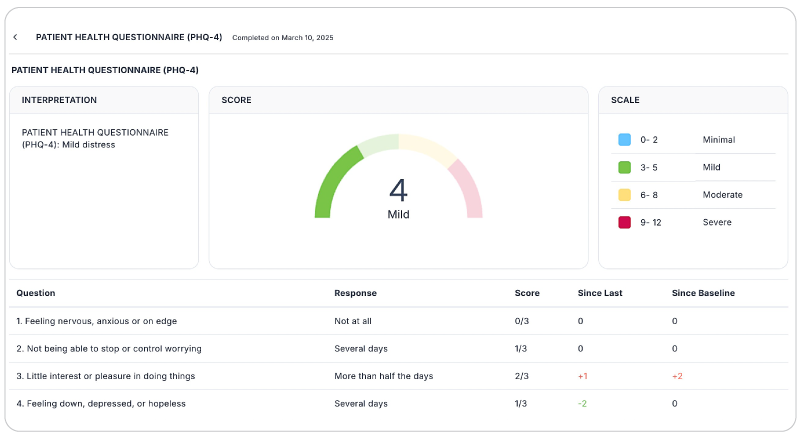Outcome measures

An outcome measure is a brief assessment used to identify a problem that might require further evaluation and/or treatment. They typically can be completed within minutes and do not require much specialized training to administer. Because they are limited items, they usually do not possess the validity and reliability of full assessment measures. As such, they are used as an indicator of potential difficulties, rather than a definitive diagnostic tool. Outcome measures vary in quality but the most reputable have been thoroughly researched and subject to rigorous scientific analysis.
Summary
- Outcome measures are quick assessments used to identify potential problems requiring further evaluation.
- Therapy outcome measures are used in therapy to help therapists pinpoint concerns early in treatment, provide objective data and validate their clinical impressions.
- Considerations for using outcome measures include the types, process, cost, financial impact, voluntary participation, follow-up testing and confidentiality.
- When using screening results in therapy, therapists should explain the results in a way that clients understand.
- Retention and storage of screening materials should follow state regulations on data retention.
- Technology and practice management tools like EHR and practice management software streamline the administration and storage of therapy outcome measures.
Streamline your practice with One EHR
- Scheduling
- Flexible notes
- Template library
- Billing & payments
- Insurance claims
- Client portal
- Telehealth
- E-fax

Why are outcome measures used in therapy?
Mental health outcome measures are usually administered early in treatment to assist the therapist in pinpointing areas of concern. After the intake session, the therapist may start to form a diagnostic impression but desire further validation before the bulk of treatment begins. Outcome measures are objective tools that provide the therapist with data that informs diagnosis and potential treatments.
Mental health outcome measure considerations
The following aspects of outcome measures must be clear to therapists and clients:
- Types of mental health outcome measures: Mental health outcome measures have been created for a variety of problems that are often encountered in therapy. Some of the most popular are for psychiatric disorders (e.g., the Generalized Anxiety Disorder-7, and the Patient Health Questionnaire), substance abuse (e.g., the Alcohol, Smoking and Substance Involvement Screening Test), insomnia (e.g., the Insomnia Severity Index), and suicide risk assessment (e.g., the Ask Suicide-Screening Questions). Therapists must explain the specific focus of the outcome measure to be administered to their client.
- Screening process: The process of administering an outcome measure must be described to the client. The majority of screenings are self-report questionnaires but some may be given through interview or observational methods. Additionally, clients have the right to know how long the screening may take to complete and when they will be told the results.
- Financial information: Clients must be told upfront if there will be additional fees for screening materials and administration. Ideally, this would be covered on the fee schedule provided during intake. Many insurance plans cover preventative screenings but it is up to the client to determine if their particular insurance company would reimburse for those costs.
- Right to withdraw: The client’s participation in taking an outcome measure is completely voluntary. They have a right to withdraw consent at any time without penalty or therapist repercussions. For example, even if they are one question away from completing a 10-item screening, they can stop without facing any consequences.
- Screening might indicate additional testing: Screenings are not full psychological evaluations. It may be tempting to take screening results and use them as justification for a diagnosis, but that would be unethical. A screening is simply a tool to further understanding. It is one piece of data that a therapist uses to form their diagnostic impression. Therefore, the client must be told that the results of a screening may lead the therapist to recommend further psychological testing, especially if the diagnostic picture is confusing.
- Confidentiality and privacy: Clients must be informed that the raw data and results of the outcome measure will not be shared with any other parties without written consent unless authorized by law.
Clients are entitled to know how data will be stored securely (e.g., electronically or in a double-locked drawer). Exceptions to confidentiality that were explained at the beginning of therapy also pertain to any outcome measures. Therapists must follow all the rules established for testing in the Health Insurance Portability and Accountability Act (HIPAA).
Practice Management + EHR + Telehealth
Mange more in less time in your practice with TheraPlatform

.
Use of screening results
Like any assessment tool, screening data and results can be misinterpreted and misused. The client must be educated about the limits of brief assessments and how they are utilized to inform treatment plans and further diagnostic testing.
After completion, the therapist will explain the results in language the client can understand. The client has a right to deny sharing the screening information with others, including other professionals. The client also is also entitled to know how long the results of an outcome measure can be shared. For instance, is it reasonable for the results to be shared five years after completion if they are likely outdated and no longer valid? A therapist must be prepared to answer any client concerns.
Retention of screening materials
Outcome measures contain sensitive information about a client. Clients are entitled to know how a therapist will store those records and how long they may keep them. Most states require therapists to keep testing records for seven years after completion, but some have different laws. Therapists must be able to explain any reasons for keeping them longer than necessary. A therapist must also be prepared to discuss what security measures are in place to ensure confidentiality.
Save time with automatically scored outcome measures
Mental health therapists can use therapy outcome measures to document progress, track a variety of key clinical indicators, helping providers make data-driven decisions, improve communication with clients, and improve client outcomes. Additionally, outcome measures help therapists adhere to compliance requirements and provide documentation needed to support reimbursement.
Watch this video to learn about how to autoscore outcome measures
→ Sign up for a Free Frial
While therapy outcome measures clearly provide benefits to both clients and therapists, they can be time-consuming, especially if clinicians score responses manually.
However, many aspects of outcome measures can be automated through an EHR like TheraPlatform:
- Sending measurements: Common assessments such as the PHQ-9 or GAD-7 can be automatically sent to clients and stored in their records or they can be scheduled on regular intervals.
- Auto scoring: TheraPlatfrom automatically scores and sums totals for common outcome measures.

- Report building and analysis: Results can be analyzed over time, with visual charts showing progress on rates of severity and session-to-session progress.
By regularly using these measures, therapists can gain valuable insights, tailor interventions, and improve client outcomes while demonstrating the effectiveness of their care without manual entry.
Streamline your practice with One EHR
- Scheduling
- Flexible notes
- Template library
- Billing & payments
- Insurance claims
- Client portal
- Telehealth
- E-fax

Resources
Theraplatform is an all-in-one EHR, practice management and teletherapy solution that allows you to focus more on patient care. With a 30-day free trial, you have the opportunity to experience Theraplatform for yourself with no credit card required. Cancel anytime. They also support different industries including mental and behavioral health therapists in group practices and solo practices.
More resources
- Therapy resources and worksheets
- Therapy private practice courses
- Ultimate teletherapy ebook
- The Ultimate Insurance Billing Guide for Therapists
- The Ultimate Guide to Starting a Private Therapy Practice
- Mental health credentialing
- Insurance billing 101
- Practice management tools
- Behavioral Health tools
Free video classes
- Free on-demand insurance billing for therapist course
- Free mini video lessons to enhance your private practice
- 9 Admin tasks to automate in your private practice
References
Sturm, C. (2012, February). Record keeping for practitioners. Monitor on Psychology, 43(2), 70. https://www.apa.org/monitor/2012/02/ce-corner
United States Department of Health and Human Services. HIPAA privacy rule and sharing information related to mental health. https://www.hhs.gov/sites/default/files/hipaa-privacy-rule-and-sharing-info-related-to-mental-health.pdf



